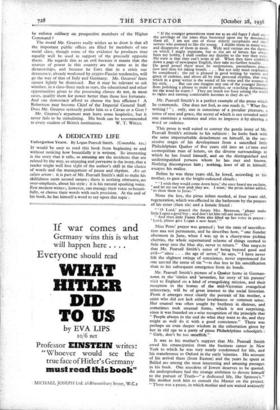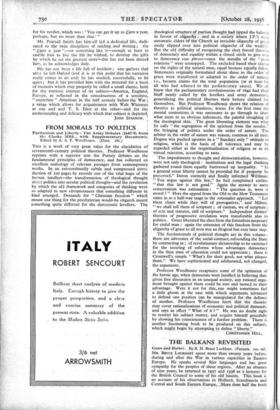A DEDICATED LIFE
Unforgotten Years. By Logan Pearsall Smith. (Constable. los.) IT would be easy to read thiS book from beginning to end without noticing how beautifully it is written. So interesting is the story that it tells, so amusing are the incidents that are related by the way, so engaging and pervasive is the irony, that a reader might well lose sight of the author's skill in the choice of words and the management of pause and rhythm. Ars est celare artem : it is part of Mr. Pearsall Smith's skill to make his skilfulness seem second nature ; there is nothing obtrusive, no over-emphasis, about his style ; it is his natural speaking voice. Few modern writers, however, can manage their voice so beauti- fully, or choose their words with such precision. At the end of his book, he has himself a word to say upon this topic : " If the younger generations treat me as an old fogey I shall enj, the privilege of the years thus bestowed upon me by denouncir them all. I am not one of those elderly sycophants and time- servers who pretend to like the young. I dislike them in many wa., and disapprove of them in more. Wide and various are the theme, on which I might expatiate, but as the art of letters has alv,-al been my hobby, I shall confine my diatribe to the way they write. My view is that they can't write at all. When they have scribbled down a page of newspaper English, they take no further trouble.. .. (In good prose] there' must be suspensions, parentheses, pauses now and then for taking breath. . . . But not only must respiration be considered ; the ear is pleased in good Writing by variety and grace of cadence, and above all by that personal rhythm, that song which in a great writer is the sound of his voice and the essence of his style. . . . But can one imagine any one of the younger literary lions polishing a phrase to make it perfect, or searching dictionaries for the word he wants ? They are much too busy setting the world to rights and earning comfortable incomes as they do so.'
Mr. Pearsall Smith's is a perfect example of the prose which he commends. One does not feel, as one reads it, " What fine writing ! " ; only, one is conscious of a peculiar pleasure, a sense of ease and grace, the secret of which is not revealed until one examines a sentence and tries to improve it by altering a word or cadence.
This prose is well suited to convey the gentle irony of Mr. Pearsall Smith's attitude to his subjects : he looks back with the same imperturbable detachment on himself, in the suc- cessive stages of his development from a sanctified little Philadelphian Quaker of five years old into an tiaane and cosmopolitan man of letters, on the diverse surroundings in which he has found himself, and on the distinguished and undistinguished persons whom he has met and known. Nothing discomposes him ; nothing, least of all in himself, escapes his malice.
Before he was three years old, he loved, according to his mother, to gaze at the bright-coloured clouds ;
" I wish they would come down here,' she once heard me exclaim, ' and let me see how pink they are. I want,' the pious infant added, ' to show them to Jesus.' " None the less, the pious infant needed, ai four years old,
regeneration, which was effected in the bathroom by the prayers of his sister (then six) and a female friend :
0 Lord,' prayed the future Mrs. Berenson, ' please make little Logan a good boy ; and don't let him tell any more lies ! '
" And then-little Fanny Potts also lifted up her voice in prayer : ' Lord, please give Logan a new heart.' "
Miss Potts' prayer was granted; but the state of sanctifica- tion was not permanent, and he describes how, " one Sunday afternoon in June, when I was up in a cherry-tree picking cherries, the whole supernatural scheme of things seemed to fade away into the blue sky, never to return." One suspe:ts that Mr. Pearsall Smith's sense of being beyond good and evil—" since . . . the age of seven," he says, " I have never felt the slightest twinge of conscience, never experienced for one seccnd the sense of sin "—is due less to his sanctification than to his subsequent emergence from its bonds.
Mr. Pearsall Smith's picture of a Quaker home in German- town in the 'sixties and 'seventies, his story of his parents' visit to England on a kind of evangelising mission, and their reception in the homes of the mid-Victorian evangelical aristocracy, will be of great interest to the social historian. From it emerges most clearly the portrait of his mother, a saint who did not lack either lovableness or common sense.
Her counsel was often sought by brethren in distress, and sometimes took unusual forms, which is not surprising, since it was founded on a wise recognition of the principle that " People always in the end do what they want to do, and they might as well do it with a good conscience." There was perhaps an even deeper wisdom in the exhortation given by her in old age to a party of pious Philadelphian schoolgirls : " Girls, don't be too unselfish." •
It was to his mother's support that Mr. Pearsall Smith owed his emancipation from the business career in New York to which he was very nearly condemned for life, and his transference to Oxford in the early 'nineties. His account of his arrival there (from Euston) and the years he spent at
Balliol are among the most interesting and amusing passages in his book. One anecdote of Jowett deserves to be quoted. An undergraduate had the strange ambition to devote himself to the pursuit of Truth—" a dedicated life, like Spinoza's." His mother took him to consult the Master on the project. " There was a pause, in which mother and son waited anxiously
for his verdict, which was : ' You can get it up to £900 a year, perhaps, but no more than that.' " Mr. Pearsall Smith has himself led a dedicated life, dedi- cated to the twin disciplines of reading and writing ; the " k90o a year ",—or something like it—enough at least to enable him to live the life- he wished, to develop the gifts by which he set the greatest storethis has not been denied hirn, as he acknowledges duly.
His has not been a life full of incident ; one gathers that after he left Oxford (and it is at this point that his narrative really comes to an end) he has studied, successfully, to be quiet ; but it has provided him with the material for a book of memoirs which may properly be called a small classic, both for the intrinsic interest of its subject—America, England; Europe, as reflected in the consciousness of a sensitive, " expatriate " Anierican in the half century before the War ; a range which allows for acquaintance with Walt Whitman at one end and T. S. Eliot at the other—and for the understanding and delicacy with which that subject is depicted.
JOHN SPARROW.

























































 Previous page
Previous page